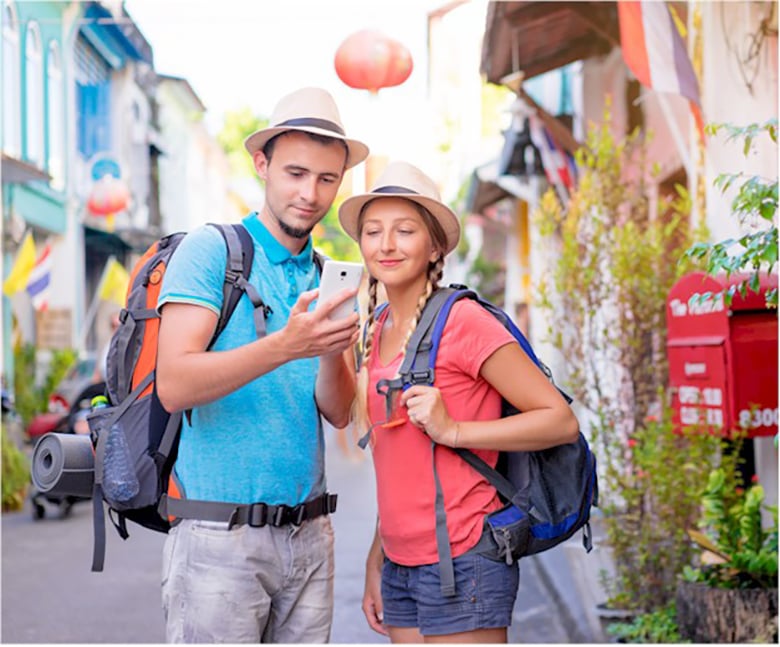The Impact of Technology on Hotel Sales and Marketing
Gone are the days when travelers sought accommodations using the local newspaper or telephone directory, picked up the phone and called to make a reservation. Hospitality sales and marketing in the 21st century is a much more vibrant, complex activity, populated by multifaceted stakeholders at every level of the industry.
This is complemented by a proliferation of new brands, ever-increasing rivalry, and a race to introduce new tools before competitors do.
The Simplicity of the Past
Achieving proper exposure was fairly simple in the past, although at the time it was considered as much of a science as digital marketing is today. Directory listings, print advertising, radio, cinema, and television were all important channels in promoting accommodations for travelers, whether they journeyed for business or leisure. Direct mail, telemarketing, referral fees and even billboards all played a role in bringing properties to the attention of the traveling public. It was interruption marketing and "spray and pray" at its best. All that has changed with the progression of technology, which is now having as much impact on the way the hospitality industry markets itself as it does on operations.
The Impact of Brands and Competition on Marketing
In an earlier article on the hundreds of new hotel brands hitting the market, we explored the reasons why many hospitality companies felt this was the best way to cater to the differences between the wants and needs of various audiences. While the diversification benefits everyone from the guests to the owners and the staff teams, it also makes "keeping up with the Joneses" look like a Sunday School picnic. Sales and marketing is also exceptionally challenging because of the potential dilution of established brands, the complexity of building overall brand loyalty, and the risk of management forfeiting their focus on less "cool" brands in the stable in favor of the latest shiny thing.
The Role of Social Media
Few industries remain untouched by the long arm of social media, and hospitality is no exception. It's critical to the success of any hotel to have a strong online presence and on social media channels. In their efforts to achieve visibility, hotels compete to incorporate inviting, "Instagrammable" backdrops into their design. Research from Travolution shows 40% of millennial travelers chose a destination based on how Instagrammable it was, bypassing the cost and availability of alcohol (24%) and the opportunities to explore local cuisine (9.4%).
Guests are constantly on the lookout for desirable locations that they can tag in their posts, while business analysts scramble to determine whether this helps to drive ROI. There's also the phenomenon of influencer marketing, where celebrities post positive messages about hotels or brands. Because of the texting generation's heightened awareness that social media postings could be sponsored, these efforts need to happen as organically as possible to appear authentic.
Social media is vital for any business these days, but it gives the hotel industry the chance to not only reach potential guests, but to build on relationships with them. Good reviews strengthen the brand's reputation, regular postings (either by marketers or guests) generate SEO content, and instant chat mechanisms support the decision-making and booking processes.
Importance of Leveraging Technology
As the hospitality industry evolves, it's clear that technology is making many more channels available for reaching potential guests. These aren't traditional marketing methods, but channels integrated with various online platforms. Airbnb, for example, while currently somewhat a pariah for the hotel industry, is a prime example of a company using a technology platform to become a hospitality provider, instead of a hospitality company trying to become a tech platform. The same can be said of ride-sharing services such as Uber and Lyft, which play a primary role in many travelers' journeys. These now qualify as hospitality companies in a way, because technology is helping to create a broader meaning of the word.
If the industry can't keep up with the opportunities presented by technology, it risks (like Survivor) being outplayed and outlasted. If it can, however, there's a chance that future collaboration could benefit all parties. Although the hotel industry is resisting it at present, Airbnb has opened up the travel experience to a wider marketplace than the industry has previously reached. This is less taking away from the pie, but rather expanding the whole. There are certainly opportunities for collaboration in the future.
The Data Dynamic
Then there's the miracle of big data. Yes, it's true that hotel brands have had to completely upend their approach to ensure the security of their systems and the safety of client information. A fact that's often overlooked during discussions of the pros and cons of technology, though, is the ability to gather first-party data from those systems, map it against second and third-party business intelligence, and generate results that can bring every property exponentially closer to fulfilling the needs of its target audience. The ability to track guests and their preferences translates into predictive analytics, which make it possible to be proactive rather than reactive.
Impact on Staffing and Operations
The rise of technology is affecting not only marketing but operations, too. It's no longer enough to have free WiFi and streaming video available to guests. Hotel rooms now come equipped with voice-activated assistants like Alexa and Siri; artificial intelligence (AI) handles basic housekeeping tasks like vacuuming, and initiatives like "Sally," the famous salad-making robot from Chowbotics, produce healthy food at the touch of a button.
The technology tornado has also had an impact on staffing requirements, with hotels' skill-set needs now becoming much broader than they were in the past. Workers have had to adapt to working with guests in a multitude of new ways. Although there's not much evidence yet of new, dedicated positions opening at senior levels, many vacancies now carry new qualification requirements for candidates to be knowledgeable in social media and content marketing.
New Age Hotel Marketing Strategies
The hotel industry is ripe for digital disruption in sales and marketing, and the process is already underway. Some of the changes taking place across the global industry include the use of chatbots providing useful information to travelers throughout their journey. Paid search, retargeting and addressable TV advertising deliver personalized recommendations based on prospects' browsing and viewing habits.
Mobile apps enhance the booking and check-in experiences and facilitate loyalty programs. Near-field communication(NFC) technology works with smart devices to provide customized, location-based suggestions for activities and excursions, and improve the ways in which guests make financial transactions, exchange content, or connect to other devices. Voice-activated assistants do more than turn on lights, TV and air-conditioning. They wear a marketing hat, too, by enabling the easy use of peripheral services such as in-room dining, restaurant reservations, and bookings for spa sessions—all of which need to be marketed to prospective guests.
Hotel marketing leaders are discovering the value of connected systems, which make it possible to monitor the number of touches and the quality of customer engagements. Content management systems provide them with the ability to hyper-personalize their marketing communications. The integration of customer data from the hotel's CRM platform with a content management system enables marketers to unlock new revenue streams.
Websites can no longer simply be online brochures showing rooms, amenities and rates. Even as hospitality shifts towards catering for the more technologically-enabled generations, it's still important that systems are optimized for all users' experience. This includes making them accessible across multiple devices and user-friendly for the broadest population possible. Online presence is important for more than marketing to guests. If potential candidates check out the website and find it less than enticing, it could stymie a hotel's chances of attracting top talent.
Other ways the hotel industry leverages technology for sales and marketing include a rapid increase in the production of video content. Whether it be live footage from an event, an influencer doing a story, or an explainer video on how to use the robot salad maker, hospitality is tapping into the trend for film rather than text. Statistics from Cisco show video ads are significantly more popular than their text counterparts, with 80% of all web traffic expected to be directed to video content by the end of 2019. Just by adding a video link to email marketing, companies can increase their click-through rates by 200-300%, and 90% of consumers reported making better purchasing decisions after viewing videos.
The Final Analysis
Hotel sales and marketing have changed dramatically in the past few years, primarily as a result of technological advances, and the hospitality industry must stay up to date with these changes. Although the industry is always reluctant to state that it's moving away from the human touch, the time is ripe to demonstrate how to use the best technology available to power the future.
While the industry must be sensitive in its messaging, every individual in the ecosystem plays a key role in defining what hospitality means, whether by enhancing personal, human touches or by perfecting customized experiences driven by data: hotel sales and marketing will continue to evolve.
Reprinted from the Hotel Business Review with permission from http://www.hotelexecutive.com/.

